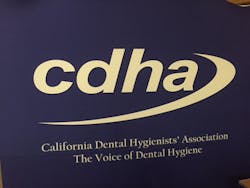Survey results: Into the minds of California dental hygienists
Forty-two percent of California dental hygienists have received an unsatisfactory response from the American Dental Hygienists’ Association (ADHA) when contacting the national association about an any issue unrelated to membership renewal, according to responses to a survey published in the June 17 issue of RDH eVillage.
Among the other 49 states, 39% of dental hygienists received unsatisfactory response during a contact with the ADHA—a slight, perhaps insignificant decrease.
The difference is that members of the California Dental Hygienists’ Association recently terminated a charter agreement with the ADHA, opting for the state association to be independent of the ADHA tripartite system.
Possibly due to the controversy associated with the CDHA’s decision, the opinions expressed California hygienists dominated the RDH eVillage survey, representing almost a fifth of the total responses. Before we explore what California dental hygienists think about their professional trade organizations, we encourage all ADHA members, as well as nonmembers, from other states to participate in the survey. The survey can be accessed here.
One demographic question asked of the national audience for RDH eVillage was: Do you belong to the ADHA? Since the landmark decision by the CDHA’s house of delegates in early June, the CDHA’s Facebook page has posted several reminders to join the independent state association. Before the split, the ADHA indicated that it would form a new state association in California. The national association, which recently hosted its annual session in Pittsburgh, did not immediately or publicly announce any plans for California dental hygienists. In fact, earlier this week, the focus for the national association was on the opposite coast in New England where the ADHA proudly supported Vermont’s approval of dental therapists.
So, the “do you belong?” question was clearly an awkward moment for California dental hygienists, who responded with comments such as “I belong to CDHA,” “until the end of June 2016, I have been a member for 41 years,” “still member [of] ADHA, member [of] CDHA,” and “just ended my membership [to ADHA].”
California dental hygienists were much less awkward about the survey’s only question pertaining to the recent split between the ADHA and CDHA: 65% were supportive of the state dental hygiene association; 9% opposed the recent decision; and 26% were uncertain about the developments.
Upcoming articles will also examine how other states viewed the split between the ADHA and CDHA.
Some of the comments from California dental hygienists include:
- The dental hygiene profession is suffering. [ADHA should] reach out to the RDHs, members or not, and find out what are the real issues.
- I would like to see this profession grow by restricting DDSs from having RDHs clock out when patients do not show. I'd also like to see hygienists get health benefits and retirement plans through their employers.
- Do not market this profession as only part time., That digs holes for us that we cannot escape.
- Much needed: a department that handles work condition-related concerns. The department would be under the direction of a competent attorney that we had standing behind our workplace questions, which could be answered and reported back to the employer with authority. I know each state's employment laws are different. That is why I support the breakoff CDHA took. At least one state can have the help it needs.
- Unionize like nurses and have more power.
- When I was in school, it was instilled in us as students to belong to the national, state, and component level. I had been extremely active and ran the Children's Dental Health Fair for eight years, very rewarding. ADHA focused more on non-relevant issues than working to unify us. They focused on all the wrong issues. If this charter was in the making for "years," why wasn't it written about in their journals and open for discussion to all ADHA members? Is it thought we wouldn't understand, or we would be confused by it? Why isn't their budget posted in the journal? The lack of transparency is horrific. Why an additional $4.50 per member for administration costs? Really, take a pay cut! Our dues to ADHA has not benefited me at all. Funny now I received a email from ADHA, first one in 41 years!
- We need to address access to care for the public, advancement of the profession and moving into hospitals and schools for cost effective prevention and care available to all. We fought to get the RDHAP in California. Now we fight to keep the funding for their patients. No end to issues. There are too many RDHs nationwide so RDHs fear reporting their employers for wrongdoing as they think they may never get another job. Dentistry has changed. Dentist used to be caring health care providers. Now it is all about the money.
- Having been involved in the decision to end the charter, it became clear it was a difference of equality and equity. The charter was trying to make all components equal. In order to be equitable you have to provide tools so that the entity can thrive. The charter did not do this in my opinion.
- I like the tripartite system but Ii don't believe in a cookie-cutter charter that encompasses all 50 states since each state has different scopes of practice and people.
- The political climate is such that "national" is too large, too distant. More can be accomplished at the state level as that is where licensing is. What has ADHA done to aid states in the advancement of hygiene regulation or non-regulation?
- The associations should work for the members, but they don't. Now that California has broken ties with ADHA, I will now join CDHA.
- If there was one thing I would like to see in our profession that would make a difference it would be to develop a union. In order for there to be overall workplace fairness, we need to have division from the dental associations and follow the path that RNs have taken. It was only after they formed unions did they gain respect for their profession and have a voice and control over how they were treated. ADHA just isn't making it happen.
- I have trouble believing that the ADHA is supportive of RDHs, and feel they control the associations to a degree.
- The importance of being part of ADHA and CDHA was deeply ingrained during hygiene school, to the point where I served as my district's student delegate. [I am] grateful for that experience. But that being said, I can't really see the true benefit of maintaining my membership anymore. I do feel much of what happens in the political arena of dental hygiene is based on power and ego, having seen this for myself as a student delegate. Combining that with no other substantial perks of membership over the years (maybe a small discount off CE courses set up CDHA/my local component, but not using the small discounts on hotels/cars/insurance) has left me feeling like I could definitely put my yearly dues toward a more constructive purpose.
- As membership has continued to decline to all time lows, it is critical to evaluate the current structure of ADHA. California may provide a reality-based example of how membership may be best achieved in the future.
- We need a new CDHA for those of us that want to continue to be a part of the national association.
- As someone who voted at the house of delegates to not sign the new charter, I am hopeful that the ADHA will be willing to work alongside CDHA to further the dental hygiene profession instead of compete with it or bring it into legal battles over remaining funds.
- I feel the decision by the CDHA was shortsighted and misinformed. Those driving the decision based their direction on emotion, opinion, and a need to control. Their proliferation of influence did not allow for balanced information to be fully understood. My concern is that we will see CDHA as a stand-alone organization take the same path as ADHA. This quest for a perceived independence has and will cost untold loss of resources and member dollars that could have been spent better in pursuing programs and advocacy to advance the profession both in California and across the country. I do believe that the profession as a whole will reunite at some point in the future, but this is such a wasted distraction. Very sad indeed, and just when our profession is a break-through point of true advancement.
- As the voice of dental hygiene, they should have done something to head off the flooding of our market. They allowed it, since they are composed of educators. [It] wasn't in their best interest. Now they will deal with the side effects of that decision.
- While I don't necessarily agree with the way California went about things, I do entirely agree that it was time to "shake things up." This survey would never have been sent had California not put a stop to the herd mentality. Maybe, just maybe, in all of this mess, we'll have an organization or two, or 50, that RDHs actually want to be a part of.
For the most current dental headlines, click here.
About the Author

Mark Hartley
Mark Hartley is the editor of RDH magazine and collaborates with Kristine Hodsdon on many of the articles for RDH eVillage, which also appear on DentistryIQ.com.
